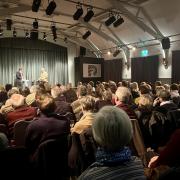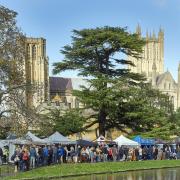This month Rupert talks about some of the less talked about heroes of the farming world
As an old ‘sheep man’, it has been a delight to have more than 500 sheep grazing on The Showground since Christmas; nibbling away at the tufty old grass so that when our summer season of events starts the grass looks pristine and the conditions for this year’s Royal Bath & West Show are top notch. I have also had cause to help out my octogenarian father with some ovine issues which has resulted in me putting on my wet weather leggings and getting hold of foot trimmers once again to undertake a touch of podiatry.
And now spring has erupted, I am warmed to the wonderful sight of ewes grazing fresh young grass while their lambs can be seen ambling along raised banks with that look of a semi-organised sports day. The biggest and strongest are skedaddling around until their mothers’ distinctive bleat of possession brings them back to the safety and comfort of the udder.
All this nostalgia is good for the soul, but it also reminded me of the extraordinary hard work our livestock farmers have to endure when providing us with some of the very best meat in the world. Much is spoken and written about the challenges the dairy industry faces, but the unsung heroes in my view are those who graft away on some of the less favourable farmland producing great meat for a very low margin.
It is easily forgotten that this rugged breed of farmer has to plan business activities many months and even years ahead so the trials and tribulations of exchange rates, flooded markets with cheap low quality imports and supply and demand are well and truly out of their control.
The gestation of a sheep is five months or thereabouts, with cattle enduring pregnancy for the same length of time as humans. When lambs are ready for the plate more than nine months has elapsed between conception and consumption and for beef that time frame can be more than three years. This is not a quick-fix standard of living; it is a long term strategy that sets out to produce a given number of finished lamb or beef at a particular time.
So when you go shopping for your favourite cut of lamb or beef for the family roast, steak night, casserole or soon-to-be-upon-us barbecue, spare a thought for the farmer who invested big bucks in his breeding stock and worked tirelessly through long nights of winter lambing and calving to bring us the very best of British meat at a price that barely equates to the minimum wage.
Farmers who love their life, who are passionate about their stock and who take great pride in producing the best for all of us, should not be underestimated but appreciated and respected.
I have said in these pages before, and I make no apology for repeating myself but NO FARMER, NO FOOD!
Rupert Cox is the CEO of the Royal Bath and West Society. For more from Rupert, follow him on Twitter! @rupert_rbw



























